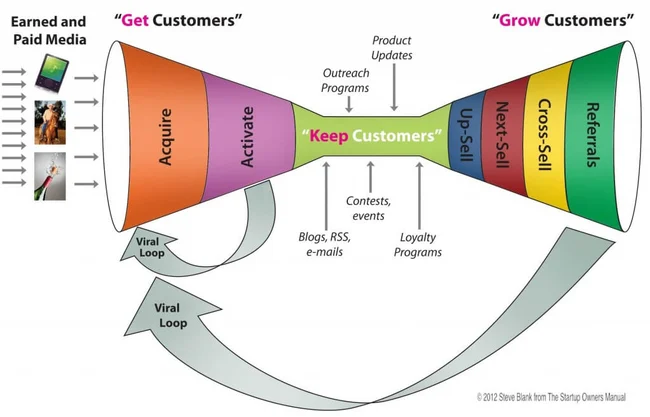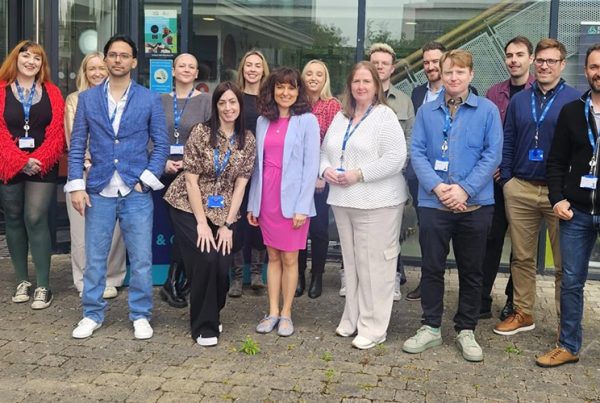
Enterprise Ireland’s New Frontiers programme has been supporting early-stage startup founders for over a decade. Phase 1 is a part-time programme aimed at validating the business idea. On Phase 2 – which runs over six months full-time – founders develop a wide range of skills that will enable them to turn their idea into a revenue-generating business.
The benefits of New Frontiers are wide and varied. But what can you, as the founder, do to ensure you get the most benefit from the programme? We put this question to our Programme Managers in an attempt to distil the most relevant and important tips into a single blog that will supercharge your time on the programme and help you become the best founder you can be. This is by no means the only advice your Programme Managers will have for you, but it’s a good place to start!
In no particular order, here are tips from 10 of our Programme Managers.
Paula Carroll, National Programme Manager at Enterprise Ireland
“If I was to give only one piece of advice (which is very hard), I would say use the time whilst you are on the programme to network! It is really important to get known within the startup ecosystem, and the best way to do that is to use the connections you will have access to whilst on the New Frontiers programme. Network with your fellow participants, with other entrepreneurs within the incubation centres, with the facilitators and mentors, and also get out to events to meet potential customers and funders.”
Tony O’Kelly, Programme Manager at ATU – Galway City + Mayo Campuses
“Prioritising market intelligence is crucial, as it serves as a compass for navigating the complex terrain of business establishment and growth. This involves a thorough understanding of your target market, including customer needs, preferences, and behaviours, as well as staying abreast of competitors’ strategies and industry trends. Such insight not only informs product development and marketing strategies but also shapes investment decisions and operational adjustments. By placing a strong emphasis on market intelligence, founders can make well-informed decisions, anticipate market shifts, and adapt their business models accordingly, enhancing the likelihood of long-term success and sustainability in a competitive environment.”
Orla Reynolds, Programme Manager at Institute of Art, Design and Technology, Dún Laoghaire
“My recommendation to founders is to really understand the problem you’re solving and know your customer. Develop milestones and timelines: slowly is the only way to get somewhere quickly. Take time to methodically think through your options; look at where you are today, think about what you want the company to become, and begin to plot the steps necessary to achieve your goal. Everything will take longer than you think, and people will take a very long time to reply. Don’t stop moving forward. Even if it feels like you are going around in circles, that’s OK as long as you are spiralling up! Take time for yourself, too. Remove your self-worth from the success or failure of the business.”
Nick Allen, Programme Manager at TUS – Athlone Campus
“For founders, learning how to acquire and retain customers is paramount. Steve Blank’s insight, often encapsulated in the simple yet profound model of ‘Get, Keep, and Grow’ customers, is a cornerstone in this area. For the early-stage business, the initial goal is to secure the first customer. This ‘Concierge’ customer, so named for their significance in representing the entire business at this stage, requires an unparalleled level of personal attention and service, a level that is challenging to maintain at scale. As the business grows, strategies to acquire and retain multiple customers need to be more streamlined, incorporating tools like CRM systems, sales teams, and efficient communication channels. However, the key takeaway for start-ups is to avoid getting bogged down in elaborate marketing strategies prematurely. Instead, the focus should be on the essentials: acquiring that first crucial customer, providing exceptional service to keep them, and finding ways to grow their value over time. This approach ensures a solid foundation upon which a business can build its future marketing and operational strategies.”
 Gemma Purcell, Programme Manager at SETU – Carlow Campus
Gemma Purcell, Programme Manager at SETU – Carlow Campus
“A valuable aspect of New Frontiers is group learning and peer interaction. The group brings together a blend of different skills, experience, and backgrounds. The peer-to-peer support is invaluable, as is the unique contribution each participant brings to the workshops. Being open and sharing expertise in the workshops is encouraged and is then reciprocated by peers in other workshops.”
Mary Casey, Programme Manager at TUS – Limerick Campus
“I would advise participants to approach the programme with a curious mind. Be curious, ask questions, listen intently and probe further so that you – as the leader – can make knowledge-powered decisions. This is the opportunity to investigate the business idea further, ensure you are creating an offering that people want and that they will pay for, making it commercially viable. Don’t be opposed to challenging your early assumptions. New Frontiers gives you the time to step back, carry out in-depth customer discovery by talking to customers to understand their needs, how they are fulfilling this right now, their challenges, their budgets, how they will benefit and achieve value from your offering. Continue being curious as you develop the first version of your product offering and your first business model. Be adaptable to change as you listen to your users’ feedback. New Frontiers opens a wide network to participants from facilitators, mentors, past participants, as well as other entrepreneurs, research centres, and agencies… Ask questions of them, seek advice, and leverage the wonderful startup ecosystem that surrounds you!”
Geraldine Beirne, Programme Manager at ATU – Donegal Letterkenny and Sligo Campuses
“Maximising the peer-to-peer network is a highly under-estimated benefit of participating in Phase 2 of the New Frontiers programme. It is so important to get to know your fellow entrepreneurs – exchange insights, share your challenges and solutions. Over the six months of the programme, you will get to know each other very well as you navigate the journey together. The learnings that the programme provides through the workshops and mentoring are, of course, invaluable in helping to make your business a success. But your peer-to-peer network adds another layer and can open doors to new opportunities. Leverage the diverse perspectives and experiences within your group – they will have a wide range of areas of expertise from marketing to finance, sector specific knowledge and a wide network of contacts that you can tap in to.”
Dr Eugene Crehan, Programme Manager at SETU – Waterford Campus
“Continuously refining your business plan and pitch deck, with the guidance and expertise of workshop facilitators and the New Frontiers team, is a pivotal aspect of laying the groundwork for your entrepreneurial journey. The business plan acts as a critical roadmap, guiding you through the complexities of launching your startup and strategising for customer acquisition. Its importance cannot be overstated, as it not only serves as a blueprint for your company’s direction and goals, but also as a dynamic document that evolves with your venture. Regular updates to your business plan and pitch deck are essential, ensuring they remain relevant and reflect the changing market dynamics and internal growth of your business. This process of constant refinement and adaptation is not just about maintaining a document; it’s about nurturing a living strategy that keeps your business aligned with its objectives and responsive to opportunities and challenges.”
Colm O’Maolmhuire, Programme Manager at TU Dublin – Blanchardstown Campus
“My advice to founders is learn to manage yourself. Create a structure or system to make the best use of your time and to track your progress. It may sound like six months is a long time, but it flies! It’s easy to relax in Month 1 (“Great, I got on the programme!”); however, if you do, it suddenly becomes a five-month programme. There’s lots to do, and the last month will be taken up with worrying about how you’re going to fund yourself afterwards. The successful founders realise you’re not about being on a programme – you’re about building a business. The best way to raise funding to keep the business going is to show you can deliver. And that’s why you need to use your time (and the support we give you) on Phase 2 wisely – so you can raise funding to grow a business you’ve already shown you can start. If you manage yourself and your time well during Phase 2, you will then have a stronger case to make by the end of it.”
Aoife McInerney, Programme Manager at MTU – Cork Campus
“An open mind will help you get the most from New Frontiers. YDKWYDK or ‘you don’t know what you don’t know’ applies to all entrepreneurs, as does an immense pride in the business that you’re creating. New Frontiers is designed to support you to build your business by providing you with the time to really test your business model, access to experienced mentors, a supportive peer network AND by challenging assumptions you may have about your business. Realising that changes are needed can be tough, so to really benefit from the experience you’ve got to be ready to engage and participate with an open mind!”
New Frontiers is Enterprise Ireland’s national programme for startup founders. To learn more, read about the programme, check out the eligibility criteria, and find the application deadlines of your nearest programme.
About the author
 Scarlet Bierman
Scarlet Bierman
Scarlet is a content consultant, commissioned by Enterprise Ireland to fulfil the role of Editor of the New Frontiers website. She is an expert in designing and executing ethical marketing strategies and passionate about helping businesses to develop a quality online presence.
 Gemma Purcell, Programme Manager at SETU – Carlow Campus
Gemma Purcell, Programme Manager at SETU – Carlow Campus Scarlet Bierman
Scarlet Bierman








